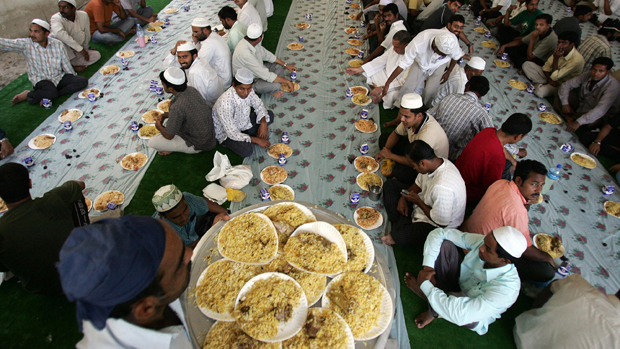When does Ramadan start in 2022?
The holiest month in the Islamic calendar is marked by fasting from dawn until dusk

A free daily email with the biggest news stories of the day – and the best features from TheWeek.com
You are now subscribed
Your newsletter sign-up was successful
The most significant event in the Islamic calendar is set to begin this week.
Ramadan, the 30-day period of ritual fasting and abstinence, is marked by as many as 1.8bn Muslims around the world.
Here is all you need to know about Ramadan 2022.
The Week
Escape your echo chamber. Get the facts behind the news, plus analysis from multiple perspectives.

Sign up for The Week's Free Newsletters
From our morning news briefing to a weekly Good News Newsletter, get the best of The Week delivered directly to your inbox.
From our morning news briefing to a weekly Good News Newsletter, get the best of The Week delivered directly to your inbox.
When does Ramadan start and end?
Although Ramadan is always on the same day of the Islamic calendar, its date on the Gregorian calendar varies from year to year. This is due to the latter being a solar calendar and the Islamic calendar being a lunar calendar.
As a result, Ramadan moves in the Gregorian calendar approximately 11 days every year, and may also vary from country to country depending on whether the moon has been sighted or not - an issue that often causes controversy between observers in different nations.
Though this year’s festival is set to begin on 2 April and end on 1 May, the dates are as yet “not confirmed”, said Forbes’ contributor Jamie Carter.
“The appearance of a 2.4% Crescent Moon just 1.5 days after being a New Moon” will determine when the month begins. “All you have to do is stand outside and look to the west at dusk on Saturday” to watch Ramadan begin, said Carter.
A free daily email with the biggest news stories of the day – and the best features from TheWeek.com
With “keen eyes, a low horizon and perhaps a pair of binoculars”, observers should be able to see the “Ramadan Moon” appear, he continued. The month will end when the crescent moon reappears around 29 to 30 days later, marking the beginning of Shawwal, the tenth month of the Islamic calendar.
This begins with Eid-ul-Fitr, a three-day celebration beginning with early morning prayers and then a day of feasting with friends and family.
How is Ramadan usually observed?
Fasting is the most well-known and important part of a normal Ramadan festival, but drinking, smoking, sex or any “sinful behaviour” is also forbidden between dawn and sunset over the entire 30-day period.
Practising Muslims abstain from food and drink during the day to help teach “self-discipline, self-restraint and generosity”, the BBC says. It’s common to have one meal, suhoor, just before sunrise and another known as iftar directly after sunset.
Knowing the exact times of sunrise and sunset is important during Ramadan, but this can be complicated as this differs around the world and sometimes even in a country. Apps such as Muslim Pro advise when to begin fasting and what time followers can eat again, and the Central London Mosque has compiled a fasting timetable for the month.
People who are sick or whose health will be affected by fasting, children, travellers, the elderly and women who are pregnant or breast-feeding do not have to fast, said the BBC.
The UK government’s Advisory, Conciliation and Arbitration Service (Acas) has advice for helping employers support Muslim employees during Ramadan, and encourages companies to try and accommodate requests to adjust working hours during the fasting period.
“Managers should anticipate that if an employee is fasting it might reduce their job performance during this period”, and “they are advised to make allowances”.
Why is the month so significant?
Ramadan marks the month when Allah revealed the Koran to the Prophet Muhammad.
Fasting is one of the five pillars of Islam (sawm). Muslims fast as an act of worship, a chance to get closer to Allah and a way to become more compassionate to those in need.
The term “Ramadan” comes from the Arabic word ramiḍa or ar-ramaḍ which means scorching heat or dryness.
What is the Night of Power?
On the 27th day of Ramadan, Muslims mark Lailat al Qadr – the “Night of Power”. This is Islam’s holiest night and commemorates the day the Koran was revealed to the Prophet Muhammad. It involves spending the night praying, studying and reciting the holy text.
However, the exact day of Lailat al Qadr falls was never actually specified by the Prophet Muhammad and some Muslims choose to commemorate all the last ten days of Ramadan as if they were Lailat al Qadr.